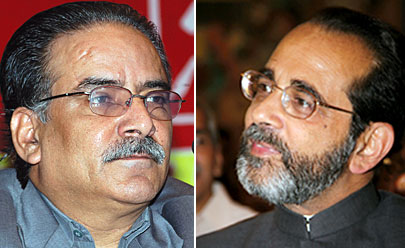 MIN RATNA BAJRACHARYA |
NEW DELHI. The Indian establishment is confused about what to do next in Nepal.
After May 2009, there was a certain coherence among the different actors who shape Delhi's Nepal policy. The key tenet was to maintain the 'democratic alliance' within Nepal to pose a political challenge to the Maoists. But the formation of the current government, the shift in power equations within the Indian bureaucracy, and a review about what India has gained and lost in this period has led to divisions.
For all its democratic orientation, foreign policy ÔŅĹ especially when it comes to neighbours, where security interests are involved ÔŅĹ is a fairly closed affair in India. Less than a dozen people in the Prime Minister's Office, Ministry of External Affairs (MEA), and the Research and Analysis Wing (RAW) call the shots.
On Nepal, some people had been arguing that it was necessary to engage with the Maoists and get them back on board. But there was strategic determination not to do so until the Maoists underwent a 'course correction'. The consensus that the Maoist strategic calculus could only be changed by mounting a united political offensive against them is now broken and two distinct lines, with elements that overlap, are discernible.
The first is the line that has been pushed for the past few years by the Indian embassy leadership here, key MEA and RAW officials who handle Nepal, and the National Security Advisor.
This school was convinced that the Maoists were aiming to establish a one-party communist state; if left unchallenged, they had the capacity to do so; and the Maoists were hostile to Indian security interests and could not be trusted with power. So the priority was to keep the Maoists out, raise costs for them for backtracking on promises, frustrate their designs, and eventually let the CA dissolve without the constitution being drafted in order to dry out a major source of legitimate strength for the Maoists and shift power away from them. The former rebels would be left without a stake in the government; there would be no legislature; and there were clear limits to street action, thus foiling Maoist plans to consolidate power through 'sadak, sadan ra sarkar' (street, parliament, and government).
But the collapse of the 'democratic alliance'; the perception that China has gained political space and introspection about whether Indian rigidity has allowed that; recognition that the CA may get extended again; the limited appetite within Nepal for an all-out confrontation; and the growing difficulties in keeping Maoist Chairman Dahal out of power have all led to the emergence of a second line.
Key people in MEA, who are not directly on the Nepal desk but have influence, have been arguing for a fresh approach that does not expose India so starkly and allows events to take their natural course. Questions are being raised about whether a direct deal with the Maoists was possible, and preferable to the arrangement that has now taken shape. There has also been a change in the top leadership of the intelligence agencies, and it is willing to review the existing approach. Make no mistake, this school does not trust the Maoists, neither does it intend to give them a blank cheque. They too will insist on progress on integration and rehabilitation, and will not compromise on certain democratic precepts. But they dismiss suggestions that dissolving the CA is either possible or desirable; believe that even if Dahal comes to power, Indian security interests will not be affected; and see no reason why they should invest so much in backing domestic players with a weak mass base who themselves are not serious about fighting the Maoists.
There is also lack of clarity on how to deal with the Jhala Nath Khanal government. Some have suggested that since the left alliance may well consolidate, it is perhaps best to do business with them and use the opportunity to push the Maoists to deliver on commitments. But the general sense is that this government has its roots in anti-Indianism. They feel that a strong opposition is essential to keep the government in check, as its consolidation will mean the long-term marginalisation of the Nepali Congress and Madhesi forces that India is close to. For now though, officials are happy to see Khanal and Dahal get bogged down in internal challenges, and are waiting for the government's roadmap on the peace process.
While there is a danger that Nepali politics will be held hostage to inter-agency battles in Delhi, the breakdown of the earlier 'keep the Maoists out' compact is a positive thing. The debates could potentially force policymakers to
re-examine their assumptions and attune themselves better to the political realities on the ground. The Maoists would do well to seize the opportunity, reach out, and take steps that would allay Indian apprehensions on the peace process and its own security interests.
READ ALSO:
Death of a statesman, EDITORIAL
The Big Three's hostage, DAMAKANT JAYSHI



